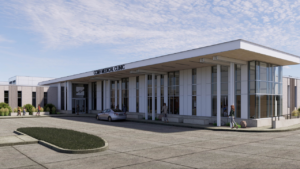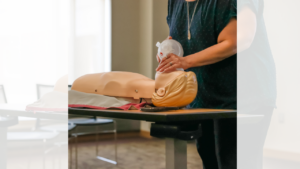October is a month marked by pink ribbons, heightened media attention, and community events—all in support of Breast Cancer Awareness Month. This annual campaign serves not only to increase awareness about breast cancer but also to promote early detection, treatment options, and support for those affected. Understanding breast cancer and the importance of awareness can be a game-changer in the fight against this pervasive disease.
Sarah Steadham, Radiologic Technologist at CCMH, says the earlier any cancer can be detected, the better the chances of successful treatment.
“Especially with breast cancer, early detection provides a greater range of treatment options. Not only will there be more alternatives and a better chance of curing the cancer, but the treatment is typically less invasive and less expensive.”
Understanding Breast Cancer
Breast cancer occurs when cells in the breast begin to grow uncontrollably, forming a tumor that can often be felt as a lump. According to the American Cancer Society, about 1 in 8 women will be diagnosed with breast cancer in their lifetime. While the statistics can be daunting, early detection has proven to significantly increase the chances of successful treatment and survival.
Steadham addresses the myth that men don’t get breast cancer.
“Approximately 2000 men get diagnosed every year with breast cancer. It’s very important for women, but also for men, to see their provider if they notice something amiss.”
The Importance of Early Detection
Early detection is critical in the battle against breast cancer. Regular screenings, such as mammograms, can identify breast cancer long before symptoms appear. The American Cancer Society recommends that women begin annual mammograms at age 45, with the option to start at 40. Self-examinations and being aware of changes in your breasts are also vital components of early detection.
Knowing your family history and discussing it with a healthcare provider can lead to proactive measures and screening, according to Steadham.
“About 5 to 10 percent of breast cancer cases are thought to be hereditary. If there is a close relative has been similarly diagnosed, including a mother, sister, or daughter, it doubles the patient’s risk for breast cancer. “
For early detection, Steadham recommends self-exams at least once per month.
“We recommend women do a monthly visual and physical exams of the breasts. Usually, you can stand and look in the mirror and make sure there is no visual dimpling, no sagging, no obvious red marks or other abnormalities. The shower is usually the easiest place to check for lumps or any areas that might feel different.”
Mammography Testing
Steadham has extensive experience in providing mammograms for women.
“I’ve been doing mammography for about 21 years now. Technology over the last 20 years has markedly improved. Not only in the comfort for patients but the fast exam time as well. The quality of the images we get now are also vastly improved. Digital technology has come such a long way that diagnosis is much easier than it used to be. We have fewer false positives, and we also have more possible positives we would not have been able to see on film.”
From start to finish, mammography usually takes about 20 to 30 minutes.
“First, we update the patient’s history form and then we’ll do four images, two images on each breast. Once the patient is dressed, they’re free to leave. The next day, we send a letter with their results. Their medical provider gets the report either later that day or the next day. If we need a patient to come back, we usually call within a day or so to get that scheduled. The best part? The physical comfort level for mammography is dramatically better. Mammography is not necessarily a comfortable test, but it should not be painful.”
Making an Appointment for a Mammography
Women may self-refer for a mammogram, Steadham notes.
“If the patient has a medical provider who can receive the report, and will follow-up with the patient, women can call the CCMH Radiology department and get a mammogram scheduled. All of the mammography techs at CCMH are wonderful. We will walk you through everything. We want you to get a good exam, with good pictures, and keep you as comfortable as possible.”
To make an appointment for a mammography, call the CCMH main number at 712-265-2500.
Conclusion
Breast Cancer Awareness Month serves as a vital reminder of the importance of education, early detection, and community support in the fight against breast cancer. It empowers individuals to take charge of their health through screenings and self-examinations while fostering a supportive environment for those affected.


